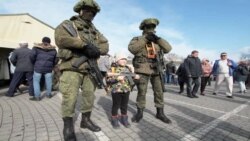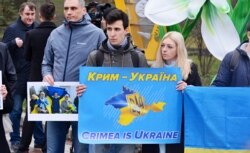On February 26, the White House released a statement concerning Russia’s invasion of Ukraine in 2014, which the United Nations estimates had resulted in up to 13,200 deaths as of February 2020.
“Seven years ago today, Russia violated international law, the norms by which modern countries engage one another, and the sovereignty and territorial integrity of its neighbor Ukraine, when it invaded Crimea,” the statement read.
Saying the U.S. continues to stand with Ukraine, the administration of President Joe Biden said this “somber anniversary” would serve to reaffirm the simple truth that “Crimea is Ukraine.”
“The United States does not and will never recognize Russia’s purported annexation of the peninsula, and we will stand with Ukraine against Russia’s aggressive acts,” the White House said.
Responding on March 1, Russian presidential spokesman Dmitry Peskov flatly denied that Crimea had been annexed.
"It is indeed impossible to recognize the annexation of Crimea, and nobody is talking about the annexation of Crimea, because it never happened," Russia’s TASS news agency cited Peskov as saying.
Peskov argued that the Crimean parliament's March 17, 2014, decision to officially declare its independence from Ukraine was lawful.
"A perfectly clear and flawless set of legal actions was undertaken here, therefore no annexation took place, and there is no need to recognize it ['annexation']. One must only recognize the fact of reunification of Crimea and Russia and the fact that Crimea has had the status of a Russian region for quite some time, thank God," Peskov said.
That is false. Russia’s military occupation and annexation of Crimea violated international law, as well as post-Soviet agreements Russia signed establishing the sovereignty and borders of Ukraine.
As Polygraph.info previously reported, Russia’s takeover of Crimea in February 2014 began when Russian special forces, operating without national insignia, seized the Crimea parliament building and raised the Russian flag. The bloodless invasion by the so-called “little green men” resulted in unmarked Russian soldiers taking control of the peninsula.
Russia’s ex-military intelligence officer Igor “Strelkov” Girkin, a leading “self-defense” commander in Crimea and later commander of separatist forces in eastern Ukraine, admitted in a 2015 interview that Crimean parliament members were herded into a chamber at gunpoint and forced to support the annexation.
The subsequent Crimea status referendum, carried out under military occupation, did not allow for public debate or for political leaders from greater Ukraine to visit the Crimean peninsula.
The referendum also violated Ukraine’s constitution by not giving all of Ukraine’s citizens the right to vote on Crimea’s status.
Neither option on the referendum allowed for the citizenry to vote to preserve the status quo.
And while Russia has long maintained 96.77% of voters supported reunification with Russia, a report by Russia’s own Human Rights Council suggested that only 15% to 30% of eligible voters in Crimea cast ballots in favor of unification with Russia.
On March 27, 2014, the United Nations General Assembly adopted Resolution 68/262, stating that the referendum, “having no validity, cannot form the basis for any alteration of the status of the Autonomous Republic of Crimea or of the city of Sevastopol.”
The U.N. resolution urged all countries “not to recognize any alteration of the status” of Crimea.
On December 7, 2020, the United Nations adopted the resolution "Problem of the militarization of the Autonomous Republic of Crimea and the city of Sevastopol, Ukraine, as well as parts of the Black Sea and the Sea of Azov.”
The resolution calls on Russia “to immediately, completely, and unconditionally withdraw its military forces from Crimea and end its temporary occupation of the territory of Ukraine without delay.”
The European Union released a statement that day reiterating it would not accept Russia’s “illegal annexation of Ukraine’s Autonomous Republic of Crimea.”
“Russia's actions are in blatant breach of international law and key principles of international order. They are a violation of the U.N. Charter, which prohibits the use of force against the sovereignty, territorial integrity or political independence of any State. Moreover, they violate Russia's international and bilateral commitments and the principles of regional European security and stability, enshrined in the Helsinki Final Act and the Charter of Paris – foundations of the OSCE [Organization for Security and Co-operation in Europe], as well as of the Budapest Memorandum of 1994,” the EU statement read.
The EU further stated that U.N. resolution 68/262 “was supported by the vast majority of the U.N. General Assembly.”
Peskov’s comments fit a broader pattern of Russian disinformation surrounding Russia’s illegal Crimean land grab.
According to a recent study by the Kyiv-based Institute for Mass Information, the “lion’s share” of news about Crimea in Russian mass media concerns the “historical ties” between Crimea and Russia.
That includes the claim that Ukraine essentially “exchanged Crimea” for Western support.
The study found that approximately 15% of Crimea-related coverage in the Russian media was anti-Ukrainian and anti-Western propaganda.
The study was conducted with support from the U.S.Agency for International Development Media Program in Ukraine.







